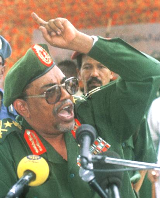Sudan president slams ‘plotters’ behind Darfur crisis
KHARTOUM, Sudan, Aug 14, 2004 (Dow Jones) — Sudan’s president attacked “plotters” and “enemies” fomenting the crisis in Darfur, but said in comments broadcast Saturday that his forces will stamp out the 18-month conflict that has killed an estimated 30,000 people in the country’s west.
 Omar el-Bashir’s remarks, aired on state-run radio to coincide with military celebrations Saturday, appeared aimed at defending his government’s claims that rebel groups were behind the Darfur conflict, which the U.N. says has caused the world’s worst humanitarian crisis with more than 1 million left homeless and 2.2 million in urgent need of food and other aid.
Omar el-Bashir’s remarks, aired on state-run radio to coincide with military celebrations Saturday, appeared aimed at defending his government’s claims that rebel groups were behind the Darfur conflict, which the U.N. says has caused the world’s worst humanitarian crisis with more than 1 million left homeless and 2.2 million in urgent need of food and other aid.
The U.S., European Union and humanitarian groups accuse el-Bashir’s government of backing Arab militiamen, known as the Janjaweed, with vehicles, helicopters and airplanes to attack Arab tribes people in the country’s western Darfur states.
The Sudanese government rejects these claims, along with accusations of genocide leveled by the U.S. Congress and some humanitarian groups.
Officials from the two rebel groups fighting government forces – the Justice and Equality Movement and the Sudan Liberation Army – said Saturday that they will send high-level delegations to Aug. 23 peace talks in Nigeria.
“But what worries me is the commitment of the (Sudanese) government (to mediate a peace deal) because up to now they are not fulfilling their promises to the international community, violations (of an April 8 cease-fire) are still going on…and they haven’t disarmed the Janjaweed up until now,” SLA official Adam Ali Shogar told The Associated Press in Egypt during a telephone interview.
Darfur’s troubles stem from long-standing tensions between nomadic Arab tribes and African farming neighbors over dwindling water and agricultural land.
Those tensions exploded into violence in February 2003 when two African rebel groups, the SLA and JEM, took up arms over what they regard as unjust treatment by the government in their struggle with Arab countrymen.
Since then, the Janjaweed have rampaged through the region, torching villages, killing thousands of black Africans and driving many more from their homes.
El-Bashir, who on Saturday promoted himself to field marshall from lieutenant general to take up the rank held by previous Sudanese presidents, said African rebels had sparked the Darfur conflict because they were disappointed that successful efforts were underway to end a separate, long-running conflict in southern Sudan .
“Every good thing that happens to Sudan is unfavorably received by plotters involved in a conspiracy (against the government) and, subsequently, the plotting of the enemies increases,” el-Bashir said in his speech, which was taped Thursday.
The Sudanese government has also accused Western countries of fueling the strife in Darfur in a bid to take control of the country’s natural resources.
But under heavy international pressure to end a crisis, el-Bashir said his government will stop the conflict.
“We are capable, with God’s help, to rein in the strife in Darfur and settle the situation there in a way to that would realize security, social peace, the country’s unity and sovereignty of the state,” he said.
On July 30, the U.N. Security Council gave Sudan 30 days to quell ethnic violence in the vast western Darfur region or face economic or diplomatic penalties.
El-Bashir’s vice president, Ali Osman Mohammed Taha, said in an interview broadcast Saturday that it wasn’t “practical” for his government to disarm the Janjaweed by the end of this month.
“We are doing our best to meet that deadline but definitely, due to logistical problems and limitations we have at the moment, I don’t think the time frame is practical,” Taha told the British Broadcasting Corp. in an interview recorded on Aug. 9.
Taha added that the presence of 80 African Union observers to monitor the rarely adhered to April 8 cease-fire was “acceptable at the moment,” but said international military intervention there could inflame the conflict.
“What we…feel that if international security came to Darfur, that would aggravate the situation rather than pacifying it,” he said. France has sent troops to neighboring Chad to facilitate humanitarian relief for thousands of displaced people from Darfur.
U.N. Secretary-General Kofi Annan previously raised the possibility of foreign forces being deployed to the region if the conflict wasn’t brought under control.
Sudanese government and rebel officials have said they will attend a new round of African Union-sponsored peace talks set for Aug. 23 in Nigeria.
